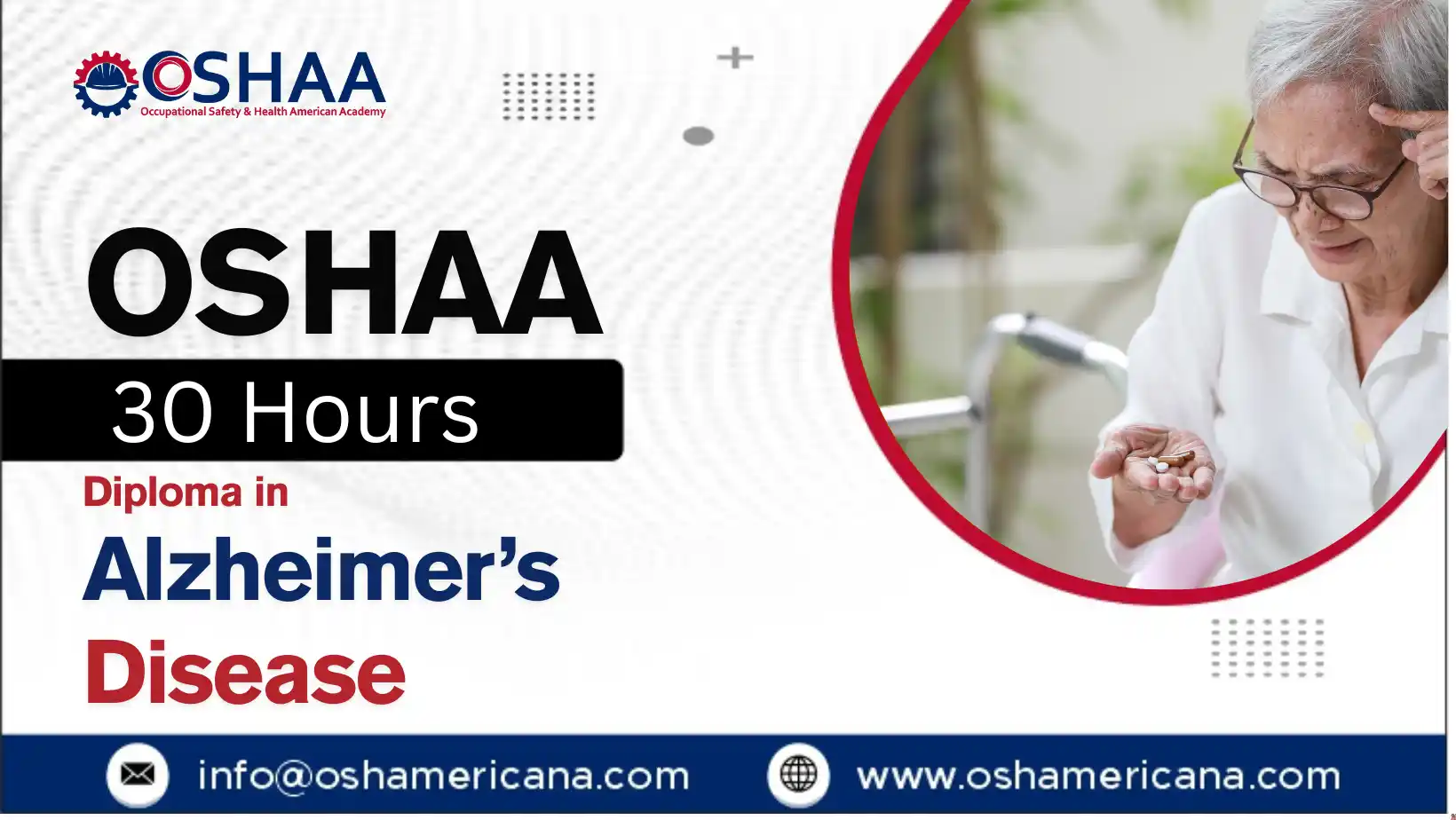The OSHAA 30-Hours Professional Diploma in Alzheimer’s Disease is an in-depth training programme designed to provide participants with a robust understanding of the causes, progression, and management of Alzheimer’s disease. Grounded in the latest clinical research and practical care strategies, this diploma supports those who wish to enhance their knowledge and competence in addressing the challenges faced by individuals living with Alzheimer’s and their support networks.
This 30-hour diploma equips participants with a clear comprehension of the neurological and behavioural aspects of Alzheimer’s disease, its stages of progression, and its impact on memory, cognition, and daily functioning. The course also introduces evidence-based approaches for care, communication, and cognitive support, alongside an understanding of the emotional, social, and ethical considerations involved in dementia care.
Developed to meet professional standards, the diploma bridges theoretical knowledge with practical application, enabling participants to provide compassionate, informed, and person-centred support in both clinical and non-clinical settings.
Completion of the OSHAA diploma can serve as a foundation for further study in gerontology, neuroscience, or dementia care. It also enhances readiness for advanced training programmes and certifications related to aged care, mental health support, or palliative services.
The OSHAA 30-Hours Professional Diploma in Alzheimer’s Disease is a meaningful opportunity for participants seeking to deepen their understanding of this complex condition. With a curriculum that combines medical insight, practical tools, and empathetic care approaches, this diploma supports the development of well-rounded, capable individuals who are ready to make a positive impact in the lives of those affected by Alzheimer’s.
OSHAA 30-Hours Professional Diploma in Alzheimer’s Disease
Study Units
Learning Outcomes
Introduction to Alzheimer’s Disease and Related Dementias (3 hours)
- Define Alzheimer’s disease and differentiate it from other types of dementia
- Understand the prevalence, global impact, and societal challenges of dementia
- Explore the historical background and advancements in Alzheimer’s research
- Recognise the importance of early education, awareness, and support in dementia care
Brain Structure, Function, and Neurological Changes in Alzheimer’s (3 hours)
- Identify key brain structures involved in memory, thinking, and behaviour
- Understand how Alzheimer’s disease affects brain cells and neural connections
- Explain the progression of neurological degeneration in Alzheimer’s
- Link changes in brain function to the clinical symptoms of cognitive decline
Risk Factors, Causes, and Early Signs of Alzheimer’s (5 hours)
- Describe the genetic, environmental, and lifestyle-related risk factors for Alzheimer’s
- Understand common causes and mechanisms behind disease development
- Identify early cognitive, behavioural, and emotional indicators of Alzheimer’s
- Analyse how early symptoms differ between individuals and subtypes
- Explore preventative strategies and the importance of timely intervention
Stages of Alzheimer’s and Disease Progression (6 hours)
- Outline the clinical stages of Alzheimer’s: mild, moderate, and severe
- Understand the changes in memory, language, mobility, and function at each stage
- Assess how the disease impacts independence and quality of life over time
- Learn how care strategies must adapt throughout the progression of the disease
- Recognise the psychosocial needs of both individuals and their families
- Identify end-of-life considerations and ethical aspects of late-stage care
Diagnostic Approaches and Screening Tools (3 hours)
- Understand how Alzheimer’s disease is clinically diagnosed
- Explore common screening and assessment tools used in evaluation
- Learn the role of neuroimaging, cognitive testing, and medical history
- Recognise challenges in diagnosis and the importance of multidisciplinary input
Communication Strategies Across Different Stages (4 hours)
- Identify how communication abilities are affected as Alzheimer’s progresses
- Develop verbal and non-verbal techniques for clear, compassionate interaction
- Tailor communication methods to each stage of cognitive impairment
- Manage communication challenges such as confusion, repetition, and withdrawal
Person-Centred Care and Daily Living Support (3 hours)
- Understand the principles of dignity, respect, and individuality in care delivery
- Learn to support daily activities such as bathing, dressing, and eating
- Create routines and safe environments that promote comfort and familiarity
- Encourage independence while providing necessary assistance and reassurance
Behavioural and Psychological Symptoms Management (3 hours)
- Identify common behavioural and psychological symptoms in Alzheimer’s
- Understand the emotional distress that underlies behaviours such as agitation or wandering
- Apply calming techniques and structured interventions to reduce symptom intensity
- Evaluate non-pharmacological and pharmacological management approaches
The OSHAA 30-Hours Professional Diploma in Alzheimer’s Disease provides participants with the essential knowledge and practical tools to understand, manage, and support individuals affected by Alzheimer’s. The course offers a range of professional and personal benefits tailored to those working in or connected to the care of individuals with cognitive decline.
- Gain a comprehensive understanding of the causes, progression, and symptoms of Alzheimer’s disease
- Develop practical skills in communication, care planning, and daily living support across all stages of the condition
- Enhance professional competence for roles in healthcare, social services, and community care
- Learn person-centred care approaches that promote dignity, empathy, and quality of life
- Acquire strategies for managing behavioural and psychological symptoms effectively
- Strengthen the ability to support families and caregivers through education and emotional understanding
- Improve confidence in recognising early warning signs and making informed decisions
- Access up-to-date research, screening tools, and diagnostic knowledge used in clinical settings
- Obtain a recognised qualification that supports career development and continuing professional education
- Contribute positively to the well-being of individuals with Alzheimer’s through compassionate and informed care practices
This diploma is specifically designed for participants who are directly or indirectly involved in the care, support, or understanding of individuals living with Alzheimer’s disease. It is suitable for a wide range of professional and personal contexts, offering valuable insight and practical tools to those seeking to make a meaningful difference.
- Healthcare professionals looking to strengthen their expertise in dementia care
- Social workers, support workers, and community care staff involved with ageing populations
- Counsellors, mental health practitioners, and therapists supporting individuals and families affected by Alzheimer’s
- Individuals working in residential care, home care, or day care services
- Family members and informal caregivers seeking a deeper understanding of Alzheimer’s and effective caregiving approaches
- Educators and advocates raising awareness about dementia and age-related cognitive decline
- Professionals preparing for specialised roles in gerontology, palliative care, or neurological support
- Participants from non-medical backgrounds who wish to build foundational knowledge for personal or volunteer purposes
No prior medical or clinical experience is required. This course is accessible, practical, and designed to support both beginners and those wishing to enhance their existing skills in Alzheimer’s care.







